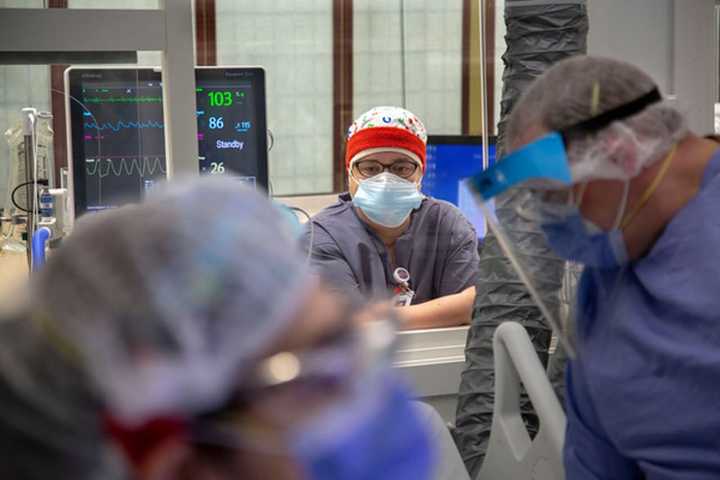And according to Daniel Finch -- Vice President of Population Health Strategies and Director of Psychiatric Urgent Care Services of CarePlus NJ -- the worst is yet to come.
“Right now, it’s all about ‘survival mode,'" said Finch, who spent nearly eight years as an emergency psychiatry doctor at Hackensack University Medical Center.
"The adrenaline is flowing. Full energy and concentration is being put toward the care of patients.
“Once things calm down and the adrenaline subsides, we’re definitely going to see a spike in mental health problems."
CarePlus NJ -- a non-profit organization that provides primary care, mental health care and substance abuse rehabilitation services -- is launching a mental health trauma hotline for first responders on May 4.
Doctors, nurses, members of EMS, police, firefighters, janitors and even grocery store workers have been going to work every day not knowing whether or not they'll come home with a life-threatening illness -- coronavirus, Finch said.
Add in the fact that virus could be passed to their family members -- and it's no wonder first responders are under an extreme amount of stress, according to Finch.
“As a physician, we’re trained to put the patient first -- at the expense of our own mental and physical health," Finch said. "But if they’re not taking care of themselves, they can’t take care of others.”
Depression, anxiety and stress can all cause loss of concentration, inability to think clearly and problem solve -- especially in crisis situations, the physician said.
“It can also lead to an increase in medical errors because of those things, and then eventually, if left untreated, it can lead to complete burnout.”
Burnout is a particular risk because of the “patient-first” mentality first responders are trained to uphold, Finch says.
Depression, anxiety, feelings of numbness and panic attacks are just some of the signs and symptoms associated with stress and trauma.
An ER doctor and EMS worker in New York City recently committed suicide over the coronavirus crisis.
Untreated stress and trauma can manifest through several physical, mental and emotional symptoms, including increased use of drugs and alcohol and increased depression and anxiety, according to Finch,
Panic attacks are also common reactions and include chest tightness, a racing heart, shortness of breath, dizziness, shakiness and feeling “like you’re dying — similar to a heart attack,” Finch said.
Longer-term effects of untreated stress and trauma can lead to reactions like PTSD, which Finch says presents with symptoms such as lifelike nightmares, vivid flashbacks and memories and a tendency to avoid triggering people, places and things.
Depression isn’t always as clear-cut as feeling sad or hopeless, Finch noted.
"Sometimes, it manifests as irritability and anger, feelings of numbness and being isolated from loved ones, or even no feelings at all,” he said.
The most serious risk of untreated stress and trauma is having thoughts of suicide or wanting to self-harm, which Finch says is a “mental health emergency that needs immediate professional help.”
“Suicidal thoughts," he added, "there’s a stigma associated with that. So a lot of people try to avoid that subject. But it’s the most serious effect of trauma and needs to be talked about.”
The risk of first responders providing a lower quality of care when burdened by untreated trauma and stress is also concerning to Finch.
Though tensions are undoubtedly running high for first responders everywhere, Finch encourages the practice of "mindfulness" -- being aware of your own emotional and mental state, he said.
“Be aware of your burnout level. Take time to go off by yourself for a few minutes and take a self-inventory of what you’ve been through, how it’s affecting you and how you’re holding up.”
First responders should practice self-care by maintaining a sense of normalcy wherever possible, he noted.
“Try to spend time with your family and friends and maintain as much normalcy as you can in that little time you have between shifts with that little energy you have between shifts,” Finch said.
“You’re tired, you’re focused on your next shift and you’re thinking about the patients you had during your last shift, but find some normalcy — find joy and love in the eyes and in the arms of your friends and family.
“It’s really critical that first responders don’t wait until the damage is done to seek help,” he said.
As a whole, Finch emphasizes the importance of monitoring mental health because it directly coincides with physical health.
“It doesn’t get the same emphasis that physical health has gotten, but mental health affects physical health,” he said.
“Uncontrolled depression, anxiety and stress lead to an increased risk of high blood pressure, heart disease, strokes and heart attacks, so mental health translates into physical health if untreated.”
Above all, valuing and protecting the mental wellbeing of first responders during these unprecedented times is more than merely a kindness or courtesy — it’s a universal, unending obligation.
“It’s really important that we take care of the people who are taking care of others,” Finch said. “They’re really our heroes, and we need to treat them like heroes.”
The mental health hotline at 201-262-HELP is available to anyone at any time. The National Suicide Prevention Hotline is 1-800-273-8255, and redirects to local crisis hotlines as well.
Click here to follow Daily Voice West Milford and receive free news updates.

